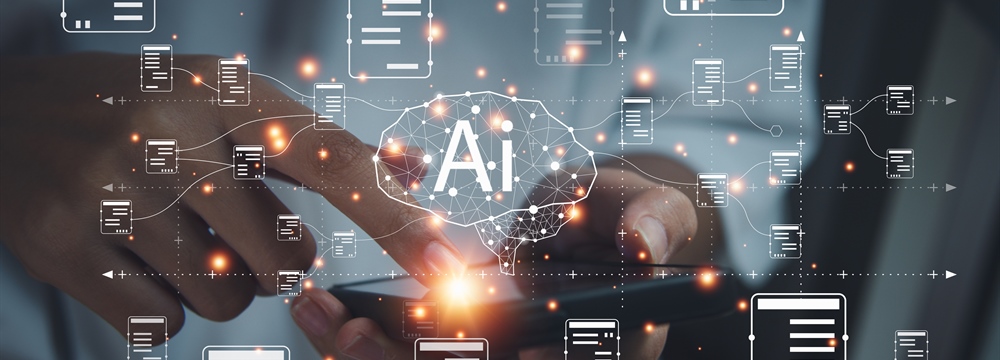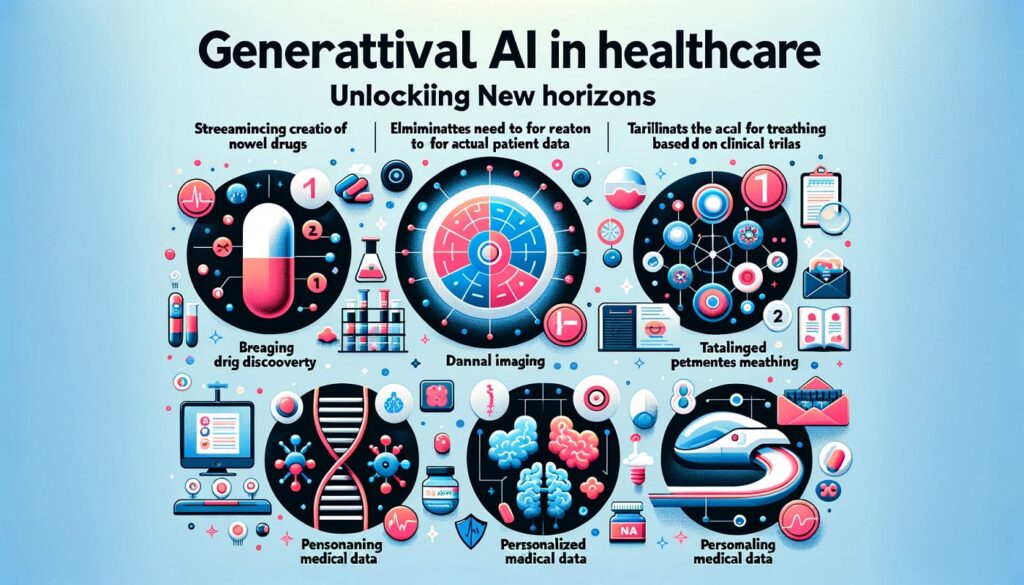Harnessing the Power of Generative AI
Introduction:
In recent years, the integration of artificial intelligence (AI) into various sectors has revolutionized processes, decision-making, and outcomes. One of the most promising areas of AI application is in healthcare, where it has the potential to transform diagnosis, treatment, and patient care. Among the many branches of AI, generative AI stands out as a game-changer, offering innovative solutions to complex healthcare challenges. In this article, we’ll delve into the world of generative AI in healthcare, exploring its applications, benefits, and the promising future it holds for the industry.

Understanding Generative AI in Healthcare:
Generative AI, a subset of artificial intelligence, focuses on creating new content, images, or data based on existing inputs. Unlike traditional AI models that analyze data to make predictions or classifications, generative AI algorithms have the ability to generate entirely new information. In healthcare, this technology holds immense potential for driving innovation across various domains, from drug discovery to personalized medicine.
Applications of Generative AI in Healthcare:
- Drug Discovery and Development: Generative AI algorithms can analyze vast amounts of chemical and biological data to predict the properties of new molecules. This capability expedites the drug discovery process by identifying potential candidates for further testing, thereby accelerating the development of novel therapeutics. Additionally, generative AI can optimize drug formulations to enhance efficacy and reduce side effects.
- Medical Imaging and Diagnostics: Medical imaging plays a crucial role in diagnosing diseases and monitoring treatment progress. Generative AI algorithms can enhance the resolution and quality of medical images, enabling more accurate interpretation by healthcare professionals. Moreover, these algorithms can generate synthetic images to simulate various medical conditions, aiding in training healthcare practitioners and refining diagnostic techniques.
- Personalized Treatment Planning: Every individual’s genetic makeup, medical history, and lifestyle factors influence their response to treatment. Generative AI algorithms can analyze patient data to generate personalized treatment plans tailored to each individual’s unique needs. This approach maximizes treatment efficacy while minimizing adverse effects, leading to better patient outcomes and improved quality of life.
- Virtual Patient Simulation: Virtual patient simulation involves creating digital models that replicate human physiology and pathology. Generative AI algorithms can generate realistic virtual patients for educational purposes, allowing healthcare professionals to practice procedures, refine surgical techniques, and simulate disease progression. Additionally, these simulations facilitate medical research by providing a platform for testing new therapies and interventions.
Benefits of Generative AI in Healthcare:
- Accelerated Innovation: By automating data analysis and predictive modeling, generative AI expedites the pace of innovation in healthcare. Researchers can explore vast datasets and discover novel insights that may have been overlooked using traditional methods. This accelerated innovation cycle enables the rapid development of new treatments, diagnostics, and medical technologies.
- Enhanced Precision and Accuracy: Generative AI algorithms can process large volumes of data with remarkable precision, enabling healthcare professionals to make more accurate diagnoses and treatment decisions. By leveraging AI-generated insights, clinicians can tailor interventions to each patient’s specific needs, minimizing errors and optimizing outcomes.
- Improved Patient Outcomes: The personalized nature of generative AI-driven healthcare interventions translates into improved patient outcomes and enhanced quality of life. Patients receive treatments that are tailored to their unique characteristics, leading to better symptom management, reduced treatment-related side effects, and faster recovery times.
- Cost Savings and Efficiency: By streamlining processes, automating repetitive tasks, and optimizing resource allocation, generative AI contributes to cost savings and operational efficiency in healthcare organizations. From drug discovery to clinical decision support, AI-driven solutions enable healthcare providers to deliver high-quality care while minimizing waste and inefficiencies.

The Future of Generative AI in Healthcare:
As generative AI continues to evolve, its impact on healthcare is poised to grow exponentially. Advancements in machine learning algorithms, data analytics, and computational power will further enhance the capabilities of generative AI, unlocking new opportunities for innovation and discovery. However, along with its potential benefits, generative AI also presents ethical, regulatory, and privacy challenges that must be addressed to ensure responsible deployment and use in healthcare settings.
Conclusion:
Generative AI holds immense promise for revolutionizing healthcare by driving innovation, improving patient outcomes, and enhancing operational efficiency. From drug discovery and personalized medicine to medical imaging and virtual patient simulation, the applications of generative AI are vast and diverse. As researchers, healthcare professionals, and policymakers continue to explore the potential of this transformative technology, the future of healthcare looks brighter than ever, powered by the ingenuity of generative AI.




